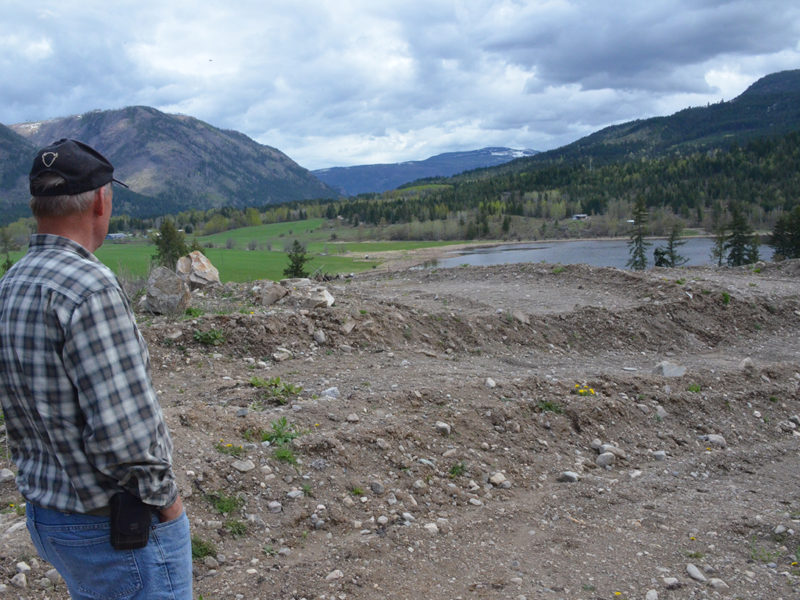KAMLOOPS – A project to transform a logging site into productive pasture using biosolids from the city of Kamloops has been sidelined after the rancher was the target of harassment.
Conrad Schiebel of Turtle Valley Bison Ranch near Chase faced a road blockade, a social media smear campaign, defacement of his property and death threats throughout last year.
“People accused us of being environmental terrorists,” says Schiebel. “That really cuts deep.”
Schiebel says the ranch has lost income and customers, suffered damage to its reputation and neighbours have turned against it. Work to build the pasture has stopped, while Kamloops now faces the challenge of what to do with its stockpile of biosolids.
Ironically, the group harassing Schiebel is part of the very same First Nation that proposed the project in the first place.
Firebreak
During the winter of 2017-18, the ranch logged a 70-acre parcel of their land, which is privately held and outside the Agricultural Land Reserve. Schiebel aimed to build a firebreak for its current pastures and hoped the site would provide more grass for its herd of 75 bison.
“Late in 2018, we were approached by the Little Shuswap Lake Indian Band leadership to consider a biosolids application as a possible way to turn our logged area into productive pasture,” recalls Schiebel. “Both the elected council and several hereditary chiefs gave their support.”
Pasture seeding on the glacial till was completely unsuccessful in 2018 and the idea of biosolids held some promise. Schiebel spent a year researching biosolids before making a decision.
“We reviewed the practice with several agricultural, soil and water scientists as well as the BC government website on organic waste regulations,” says Schiebel. He adds that the website has high-quality, evidence-based information about the use of biosolids, which is a controlled substance under the province’s Organic Matter Recycling Regulation.
They also met with Arrow Transport, the company with the contract to manage the 19,500 wet tonnes of biosolids Kamloops produces each year, as well as an independent professional agrologist.
“They deemed our ranch as being an excellent site for this type of reclamation project,” says Schiebel. “The site has since been assessed by an independent hydrologist who also concurred that the risk to any surrounding water sources or aquifers would be extremely unlikely.”
Turtle Valley has a serious commitment to the land and its community.
“The ranch has worked diligently to implement our environmental farm plan,” notes Schiebel. “We have always worked closely with neighbouring First Nations and included them in all our farming and land development plans.”
The ranch received a permit from the province and Arrow began its deliveries in early April.
The biosolids are mixed with sawdust before being trucked to the site and deposited in a prepared trench. A backhoe combines the mixture with the glacial till before filling in the trench. The resulting soil has a 7% biosolid content.
“This isn’t just a straight surface application,” explains Schiebel.
Blockade
Area residents led by Connie Seaward began blocking the road that leads to the reclamation site on April 28, 2019 to protest the project. Arrow received an injunction against the blockade 10 days later. In turn, the protestors sought an injunction against the project. BC Supreme Court dismissed the protestors’ application against the use of the biosolids saying there was no plausible evidence to show that the biosolids would cause harm.
But Seaward’s group have certainly caused harm to the ranch. Ranch signs have been spray-painted with profanity, its vehicles and Schiebel’s RV have been paint-balled, broken glass has been thrown in the yard where its dogs run and death threats have been sprayed on nearby cliffs and a railway crossing. Schiebel figures it has cost the ranch around $100,000.
“We have lost good customers, particularly restaurants, that say they can’t be associated with all the controversy,” he says. “We had to sell off a number of our animals before maturity when things looked like they were taking a turn for the worse.”
Neighbours have not been immune to the fallout. A local contractor purchased new equipment to work on the project, but now his machines sit idle.
While local residents did not relish the idea of going to jail if they continued the blockade, that hasn’t stopped a splinter group of Shuswap Nation members from stepping in. The “Secwepemc Grassroots” reinstated the blockade in July and effectively halted the trucks. Arrow Transport, Turtle Valley and Kamloops all agreed to put the project on hold last fall.
The way a splinter group of protestors have been able to grab power from the leaders who initially proposed the project mystifies Schiebel.
“No one seems to be able to explain to us how this small group has the veto power over other First Nation representatives who were consulted and indeed introduced us to the project,” he notes.
Schiebel is equally frustrated by the fake science and vitriol that’s circulated on social media.
“The ease at which ill-informed comments or malicious attacks can now be shared is becoming a new reality for farmers and ranchers in today’s social media-driven world,” he says.
At present, the project remains idle.
“We were facing significant opposition from locals and later First Nations,” says Kamloops utility services manager Greg Wightman. “Although we were granted an injunction against the protestors blocking the road, we decided to put a pause on the project.”
The Kamloops biosolids committee has presented eight possible solutions to council. Agricultural application remains an option.
“We went through a very expensive review process to carefully outline all options,” says Wightman. “I actually presented this at a national conference and people couldn’t believe the opposition we faced in our region.”
Meanwhile, the backlog of biosolids in Kamloops continues to grow, assisted by the protestors. Sources say byproducts from local septic tanks are trucked down the road and processed and stored at the Kamloops holding facility. Every time the protestors flush, they’re adding to the problem.


 Grand Forks ducks flood
Grand Forks ducks flood